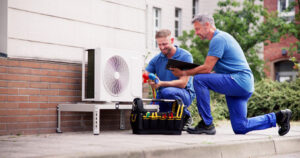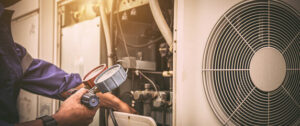If your AC system turns on and off frequently or doesn’t complete a cooling cycle, it could be a sign of an issue that is causing water leaks. Your service technician can check for this as well as other issues like squealing or rattling noises.

Your technician can also check humidity levels in your home and help you make changes to improve comfort, efficiency, and safety. Contact AC Repair Bonita Springs for professional help.
The most common AC issues aren’t complicated, but they do require professional attention. Getting regular maintenance and troubleshooting help from qualified technicians can extend the life of your system and ensure its smooth operation.
If your AC turns on but fails to cool the air in your home, check that the thermostat is set correctly and that all vents are open. Often, low airflow is caused by dirty filters or a blower that needs servicing. A clogged filter can also cause the evaporator coil to become iced or frosty, restricting air flow further. If the evaporator coil is covered in ice or frost, it can’t absorb heat and will fail to perform its cooling duties.
In other cases, your AC may be leaking refrigerant. Recharging the system may solve this problem, but if you have a leak in your system it will need to be repaired immediately. If you’re concerned about the safety of a leak, a technician can inspect your system to assess the risk.
A tripped circuit breaker may be an indicator of a serious problem with your compressor. If the compressor starts to draw too much power from the electrical system, it can overheat and trip the breaker. This is a warning sign that the compressor is about to fail, and you should have it replaced as soon as possible.
Leaking water is a common AC repair issue, and it usually occurs from the service valve. This valve is located at the bottom of your condenser, and it allows professionals to service the unit without stopping the process of converting refrigerant to vapor. If it gets clogged with debris, dirt, leaves, or algae, it won’t be able to work properly.
If you notice an unpleasant odor coming from your vents, it might be an indication that your AC is contaminated with mold. This is a result of inadequate airflow and high humidity, which create conditions that encourage mold growth. Regular cleaning of your air conditioning drain line, which includes the blower fan and ductwork, can prevent mold problems and keep your house fresh and cool.
Troubleshooting
Many AC problems can be resolved with troubleshooting techniques. The troubleshooting process involves identifying potential problems and attempting simple, non-invasive fixes to restore your system to normal operation. This can often save you money on utility bills and avoid expensive repairs.
First, check the thermostat settings and replace batteries if necessary. It is also worth checking the air filter to ensure it is clean. Dirty filters can reduce efficiency and cause the unit to work harder to cool your home. In addition, clogged drain lines can trigger safety switches that turn off the system. Using a wet/dry vac to clear the line can usually solve this issue.
Unusual noises may indicate more serious problems that need to be addressed. Rattling sounds can mean loose components, and squealing or grinding sounds suggest that belts and motor bearings require lubrication. If you hear hissing sounds, it could mean that your system is leaking refrigerant. In addition, a strong, musty smell suggests that the wire insulation has burnt out or there is mold in your system.
Other signs that it is time to call for professional help include frequent tripping of the circuit breaker or a loss of power altogether. Since AC units contain a variety of electrical parts, problems with wiring and circuit breakers can lead to serious damage when not dealt with quickly and correctly. For this reason, it is always best to have a licensed technician handle any electrical issues that arise. This will ensure your system is safe and prevent any further damage to the unit or surrounding property.
Repairs
When an AC Repair technician gets to your home, he will take an in-depth look at your AC unit and its components. He will also talk to you about what your goals are for your air conditioning. He will then inspect and service what is necessary to bring your system back to a fully functioning state.
A common problem that many people experience with their air conditioning systems is a lack of cold air coming from the vents. This usually means that the air conditioner has a problem with its compressor or condenser coil. Luckily, this is a relatively easy fix and can often be done by simply cleaning the coils. A professional technician will know how to clean the coils and what products are safe to use.
Alternatively, your air conditioner may have a problem with its blower motor. This is a little harder to fix than the compressor or condenser coil, but not impossible. Most of the time, it will be as simple as cutting off the power to the blower motor, draining and disconnecting it, and then replacing it. This is another repair that should not take more than an hour and shouldn’t leave you without air conditioning.
Other possible problems that can require an AC repair visit include low refrigerant or a clogged condensation drain. The condensation drain removes excess moisture from the air, which would otherwise ruin your ceiling, walls, and furnishings if not removed. A clogged condensation drain can cause water leaks that would be difficult to detect and could be very dangerous.
The AC repair process will usually involve a recharge of your system’s refrigerant. This is a fairly simple process and one that most professional technicians can perform quickly. They will start by determining what kind of refrigerant your system requires, measuring the operating temperatures, and repairing any leaks that need to be fixed.
Another common repair involves the evaporator coil, which is responsible for removing heat from your home’s air. These coils can become dirty over time, which can cause a variety of different problems, from reduced efficiency to poor airflow. Your air conditioning professional will be able to remove any debris from the coils, reinstall them, and clean up the area around the unit.
Maintenance
If you’re a handy homeowner or simply enjoy tinkering with mechanical equipment, you may feel comfortable performing certain AC repairs yourself. However, you should always contact a professional to ensure your AC is repaired correctly and safely.
Typically, a professional will start by determining what’s causing your air conditioning system to break down. Then, they’ll take the necessary steps to repair it. This could include checking your thermostat settings, inspecting the air filter, or even examining the electrical panel. If they suspect a larger problem, they’ll inform you of the issue and provide an estimate for the service cost.
One common AC problem is a faulty control board. The control center is what signals your air conditioner to start cooling, and if it’s not working properly, the entire process won’t work. The technician will typically replace the control board to get your home back to normal.
Another common problem is a broken compressor or refrigerant. The compressor is what compresses your system’s refrigerant into vapor, which then moves to the evaporator coil and pulls heat out of your home’s air. If the compressor or refrigerant isn’t working properly, you will definitely notice a lack of cooling in your home.
A clogged air filter can also cause your AC to break down. As air moves through the ducts, it passes through the filter, which removes contaminants like pollen and dust from your home’s air. Over time, your filters can fill up with these particles, causing them to malfunction and stopping your airflow. Changing or cleaning your air filter can help resolve this issue.
A tripped circuit breaker or burning smells can also indicate that your air conditioner is having issues. To prevent this from happening, you should make sure your breaker box isn’t overloaded or that there are no power outages in your area. In addition, it’s important to keep the outdoor unit free of debris and leaves that can block it from properly dispersing heat.
